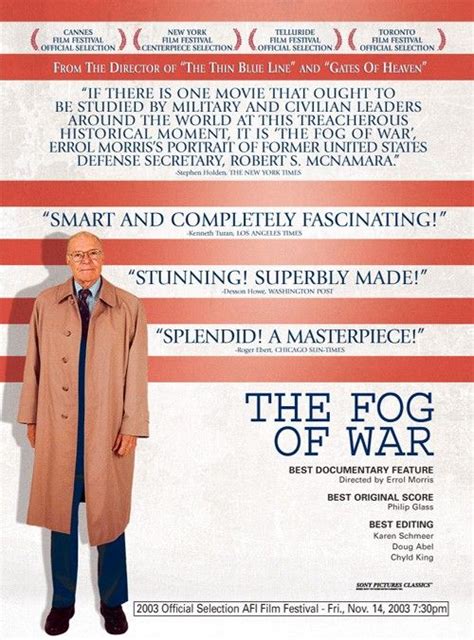The Fog of War

Description:
The Fog of War is a documentary film that examines the complexities and moral ambiguities of war through the lens of Robert S. McNamara, the former U.S. Secretary of Defense. Directed by Errol Morris, the film presents eleven lessons from McNamara's life and career, exploring his role in significant historical events such as World War II, the Cuban Missile Crisis, and the Vietnam War. Through candid interviews and archival footage, it offers a profound insight into the human and political facets of war.Keywords:
War, Decision Making, Morality, Vietnam, McnamaraWhat is the fog of war theory?
The "fog of war" refers to the uncertainty and confusion that soldiers and military leaders experience during combat. It encompasses the unpredictability of battle conditions, the difficulty in obtaining accurate information, and the complexities of decision-making under pressure. The term was popularized by the military theorist Carl von Clausewitz and is explored in the documentary "The Fog of War," which features former U.S. Secretary of Defense Robert S. McNamara reflecting on his experiences and the challenges of understanding the consequences of war.
What is the main message of the Fog of War?
"The Fog of War" explores the complex nature of war and the moral dilemmas faced by leaders. Through the perspective of former U.S. Secretary of Defense Robert S. McNamara, the film highlights key lessons from his experiences during significant conflicts, particularly the Vietnam War. The main message emphasizes the unpredictability of war, the importance of understanding history, the ethical implications of decisions made in conflict, and the need for empathy and communication to prevent future wars. It serves as a reflection on the human cost of military actions.
Why is it called the fog of war?
"The Fog of War" refers to the uncertainty and ambiguity experienced in warfare, where critical information can be unclear or misleading. The term encapsulates the challenges military leaders face in making decisions amidst chaos and confusion. In the documentary, former U.S. Secretary of Defense Robert S. McNamara reflects on his experiences during the Vietnam War and other conflicts, illustrating how this "fog" can lead to miscalculations and unintended consequences in military strategy and policy. The title emphasizes the complexities and moral dilemmas of war.
What are the 11 lessons in The Fog of War?
In "The Fog of War," Robert S. McNamara shares 11 lessons he learned from his experiences in war and peace. They are:
1. Empathize with your enemy.
2. Rationality will not save us.
3. There's something beyond oneself.
4. Maximize efficiency.
5. Proportionality should be a guideline in war.
6. Get the data.
7. Belief and seeing are both often wrong.
8. Be prepared to reexamine your reasoning.
9. In order to do good, you may have to engage in evil.
10. Never say never.
11. You can't change human nature.
These lessons reflect the complexities of war and human decision-making.
Explore More Categories:
Surrealism Mafia Arms Trade Discontent Aliens Science Fiction Thriller Avant Garde British Humor Self Destruction Misadventures Oz Universe Orphanage Coal Mining Mental Illness Investigative Journalism Yearning Film Noir Power Unexplained Events Art House Rodeo Sociopathy Human Spirit Fringe Science Agriculture